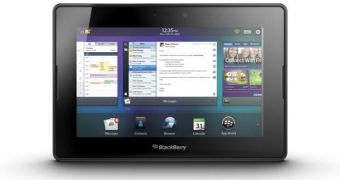Canadian mobile phone maker Research In Motion is preparing a software update of its BlackBerry PlayBook to eliminate the option to install unofficial applications on it.
The next major platform release for the tablet PC, namely PlayBook OS 2.1, should prevent users from loading applications on the device, other than those available via RIM’s official channel.
Through killing sideloading of applications on the slate, RIM is trying to prevent pirated applications from being installed on it.
The handset vendor hasn’t made an official announcement on the matter for the time being, but Alec Saunder, RIM's vice-president of developer relations, posted on his Twitter account some details regarding the company’s plans.
He confirmed both that the limitation will be introduced in BlackBerry PlayBook OS 2.1, and that it is aimed at reducing piracy. According to him, 25 percent of Android applications are pirated.
“We're removing sideloading for consumers. Pretty sure we've got a solution for devs,” Saunder notes in one tweet.
“Piracy is a huge problem for Android devs, and we don't want to duplicate the chaotic cesspool of Android Market,” he notes in another post on the micro-blogging network.
For those out of the loop, we should note that RIM has greatly expanded access to applications for its PlayBook owners back in February, when it released OS 2.0 with support for Android apps.
Developers who have applications designed for Google’s mobile operating system can easily port their software to the PlayBook, in a move that proves beneficial for all interested parties.
However, it appears that RIM is unhappy with the fact that users are loading unofficial applications on their tablet PCs, which means decreased revenues for it and app developers alike.
Hopefully, RIM’s decision will have a positive impact on user experience, and only applications that work properly will be loaded on devices. However, it remains to be seen how RIM plans on providing developers with access to sideloading on their tablets to ensure better testing of software.

 14 DAY TRIAL //
14 DAY TRIAL //